Fleurs du Mal Magazine


Or see the index

My Life had stood
– a Loaded Gun
My Life had stood – a Loaded Gun –
In Corners – till a Day
The Owner passed – identified –
And carried Me away –
And now We roam in Sovreign Woods –
And now We hunt the Doe –
And every time I speak for Him
The Mountains straight reply –
And do I smile, such cordial light
Opon the Valley glow –
It is as a Vesuvian face
Had let it’s pleasure through –
And when at Night – Our good Day done –
I guard My Master’s Head –
’Tis better than the Eider Duck’s
Deep Pillow – to have shared –
To foe of His – I’m deadly foe –
None stir the second time –
On whom I lay a Yellow Eye –
Or an emphatic Thumb –
Though I than He – may longer live
He longer must – than I –
For I have but the power to kill,
Without – the power to die –
Emily Dickinson
(1830—1886)
My Life had stood – a Loaded Gun
• fleursdumal.nl magazine
More in: Archive C-D, Archive C-D, Dickinson, Emily
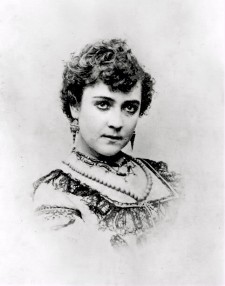
Answer Me
I
In from the night.
The storm is lifting his black arms up to the sky.
Friend of my heart, who so gently marks out the lifetrack for me, draw near to-night;
Forget the wailing of the low-voiced wind:
Shut out the moanings of the freezing, and the starving, and the dying, and bend your head low to me:
Clasp my cold, cold hands in yours;
Think of me tenderly and lovingly:
Look down into my eyes the while I question you, and if you love me, answer me—
Oh, answer me!
II
Is there not a gleam of Peace on all this tiresome earth?
Does not one oasis cheer all this desert-world?
When will all this toil and pain bring me the blessing?
Must I ever plead for help to do the work before me set?
Must I ever stumble and faint by the dark wayside?
Oh the dark, lonely wayside, with its dim-sheeted ghosts peering up through their shallow graves!
Must I ever tremble and pale at the great Beyond?
Must I find Rest only in your bosom, as now I do?
Answer me—
Oh, answer me!
III
Speak to me tenderly.
Think of me lovingly.
Let your soft hands smooth back my hair.
Take my cold, tear-stained face up to yours.
Let my lonely life creep into your warm bosom, knowing no other rest but this.
Let me question you, while sweet Faith and Trust are folding their white robes around me.
Thus am I purified, even to your love, that came like John the Baptist in the Wilderness of Sin.
You read the starry heavens, and lead me forth.
But tell me if, in this world’s Judea, there comes never quiet when once the heart awakes?
Why must it ever hush Love back?
Must it only labor, strive, and ache?
Has it no reward but this?
Has it no inheritance but to bear—and break?
Answer me—
Oh, answer me!
IV
The Storm struggles with the Darkness.
Folded away in your arms, how little do I heed their battle!
The trees clash in vain their naked swords against the door.
I go not forth while the low murmur of your voice is drifting all else back to silence.
The darkness presses his black forehead close to the window pane, and beckons me without.
Love holds a lamp in this little room that hath power to blot back Fear.
But will the lamp ever starve for oil?
Will its blood-red flame ever grow faint and blue?
Will it uprear itself to a slender line of light?
Will it grow pallid and motionless?
Will it sink rayless to everlasting death?
Answer me—
Oh, answer me!
V
Look at these tear-drops.
See how they quiver and die on your open hands.
Fold these white garments close to my breast, while I question you.
Would you have me think that from the warm shelter of your heart I must go to the grave?
And when I am lying in my silent shroud, will you love me?
When I am buried down in the cold, wet earth, will you grieve that you did not save me?
Will your tears reach my pale face through all the withered leaves that will heap themselves upon my grave?
Will you repent that you loosened your arms to let me fall so deep, and so far out of sight?
Will you come and tell me so, when the coffin has shut out the storm?
Answer me—
Oh, answer me!
Adah Isaacs Menken
(1835 – 1868)
Answer Me
•fleursdumal.nl magazine
More in: - Archive Tombeau de la jeunesse, Archive M-N, Archive M-N, Menken, Adah, THEATRE
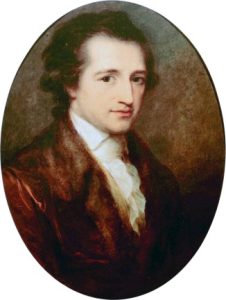
Philine
Singet nicht in Trauertönen
Von der Einsamkeit der Nacht!
Nein, sie ist, o holde Schönen,
Zur Geselligkeit gemacht.
Wie das Weib dem Mann gegeben
Als die schönste Hälfte war,
Ist die Nacht das halbe Leben,
Und die schönste Hälfte zwar.
Könnt ihr euch des Tages freuen,
Der nur Freuden unterbricht?
Er ist gut, sich zu zerstreuen;
Zu was anderm taugt er nicht.
Aber wenn in nächt′ger Stunde
Süßer Lampe Dämmrung fließt,
Und vom Mund zum nahen Munde
Scherz und Liebe sich ergießt;
Wenn der rasche lose Knabe,
Der sonst wild und feurig eilt,
Oft bei einer kleinen Gabe
Unter leichten Spielen weilt;
Wenn die Nachtigall Verliebten
Liebevoll ein Liedchen singt,
Das Gefangnen und Betrübten
Nur wie Ach und Wehe klingt:
Mit wie leichtem Herzensregen
Horchet ihr der Glocke nicht,
Die mit zwölf bedächt′gen Schlägen
Ruh′ und Sicherheit verspricht!
Darum an dem langen Tage
Merke dir es, liebe Brust:
Jeder Tag hat seine Plage,
Und die Nacht hat ihre Lust.
Johann Wolfgang von Goethe
(1749-1832)
Philine
•fleursdumal.nl magazine
More in: Archive G-H, Archive G-H, Goethe, Johann Wolfgang von, J.W. von Goethe
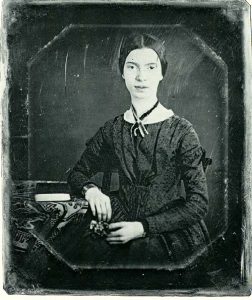
Because I could not stop
for Death
Because I could not stop for Death –
He kindly stopped for me –
The Carriage held but just Ourselves –
And Immortality.
We slowly drove – He knew no haste
And I had put away
My labor and my leisure too,
For His Civility –
We passed the School, where Children strove
At Recess – in the Ring –
We passed the Fields of Gazing Grain –
We passed the Setting Sun –
Or rather – He passed Us –
The Dews drew quivering and Chill –
For only Gossamer, my Gown –
My Tippet – only Tulle –
We paused before a House that seemed
A Swelling of the Ground –
The Roof was scarcely visible –
The Cornice – in the Ground –
Since then – ’tis Centuries – and yet
Feels shorter than the Day
I first surmised the Horses’ Heads
Were toward Eternity –
Emily Dickinson
(1830—1886)
Because I could not stop for Death
• fleursdumal.nl magazine
More in: Archive C-D, Archive C-D, Dickinson, Emily

Dreams of Beauty
Visions of Beauty, of Light, and of Love,
Born in the soul of a Dream,
Lost, like the phantom-bird under the dove,
When she flies over a stream—
Come ye through portals where angel wings droop,
Moved by the heaven of sleep?
Or, are ye mockeries, crazing a soul,
Doomed with its waking to weep?
I could believe ye were shadows of earth,
Echoes of hopes that are vain,
But for the music ye bring to my heart,
Waking its sunshine again.
And ye are fleeting. All vainly I strive
Beauties like thine to portray;
Forth from my pencil the bright picture starts,
And—ye have faded away.
Like to a bird that soars up from the spray,
When we would fetter its wing;
Like to the song that spurns Memory’s grasp
When the voice yearneth to sing;
Like the cloud-glory that sunset lights up,
When the storm bursts from its height;
Like the sheet-silver that rolls on the sea,
When it is touched by the night—
Bright, evanescent, ye come and are gone,
Visions of mystical birth;
Art that could paint you was never vouchsafed
Unto the children of earth.
Yet in my soul there’s a longing to tell
All you have seemed unto me,
That unto others a glimpse of the skies
You in their sorrow might be.
Vain is the wish. Better hope to describe
All that the spirit desires,
When through a cloud of vague fancies and schemes
Flash the Promethean fires.
Let me then think of ye, Visions of Light,
Not as the tissue of dreams.
But as realities destined to be
Bright in Futurity’s beams.
Ideas formed by a standard of earth
Sink at Reality’s shrine
Into the human and weak like ourselves,
Losing the essence divine;
But the fair pictures that fall from above
On the heart’s mirror sublime
Carry a signature written in tints,
Bright with the future of time,
And the heart, catching them, yieldeth a spark
Under each stroke of the rod—
Sparks that fly upward and light the New Life,
Burning an incense to God!
Adah Isaacs Menken
(1835 – 1868)
Dreams of Beauty
•fleursdumal.nl magazine
More in: - Archive Tombeau de la jeunesse, Archive M-N, Archive M-N, Menken, Adah, THEATRE

Vorfrühling
In dieser Märznacht trat ich spät aus meinem Haus.
Die Straßen waren aufgewühlt von Lenzgeruch und grünem Saatregen.
Winde schlugen an. Durch die verstörte Häusersenkung ging ich weit hinaus
Bis zu dem unbedeckten Wall und spürte: meinem Herzen schwoll ein neuer Takt entgegen.
In jedem Lufthauch war ein junges Werden ausgespannt.
Ich lauschte, wie die starken Wirbel mir im Blute rollten.
Schon dehnte sich bereitet Acker. In den Horizonten eingebrannt
War schon die Bläue hoher Morgenstunden, die ins Weite führen sollten.
Die Schleusen knirschten. Abenteuer brach aus allen Fernen.
Ueberm Kanal, den junge Ausfahrtwinde wellten, wuchsen helle Bahnen,
In deren Licht ich trieb. Schicksal stand wartend in umwehten Sternen.
In meinem Herzen lag ein Stürmen wie von aufgerollten Fahnen.
Ernst Stadler
(1883 – 1914)
Vorfrühling
•fleursdumal.nl magazine
More in: *War Poetry Archive, - Archive Tombeau de la jeunesse, Archive S-T, Archive S-T, Stadler, Ernst
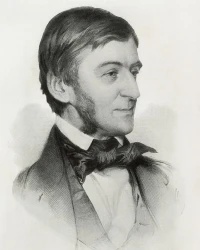
The Past
The debt is paid,
The verdict said,
The Furies laid,
The plague is stayed,
All fortunes made;
Turn the key and bolt the door,
Sweet is death forevermore.
Nor haughty hope, nor swart chagrin,
Nor murdering hate, can enter in.
All is now secure and fast;
Not the gods can shake the Past;
Flies-to the adamantine door
Bolted down forevermore.
None can re-enter there,—
No thief so politic,
No Satan with a royal trick
Steal in by window, chink, or hole,
To bind or unbind, add what lacked,
Insert a leaf, or forge a name,
New-face or finish what is packed,
Alter or mend eternal Fact.
Ralph Waldo Emerson
(1803 – 1882)
The Past
•fleursdumal.nl magazine
More in: Archive E-F, Archive E-F, Emerson, Ralph Waldo
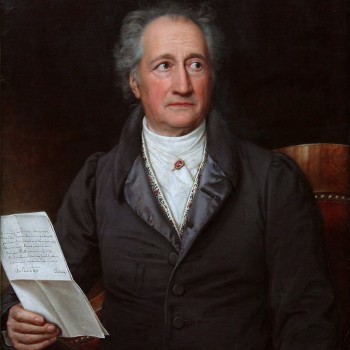
Totentanz
Der Türmer, der schaut zu Mitten der Nacht
Hinab auf die Gräber in Lage;
Der Mond, der hat alles ins Helle gebracht;
Der Kirchhof, er liegt wie am Tage.
Da regt sich ein Grab und ein anderes dann:
Sie kommen hervor, ein Weib da, ein Mann,
In weißen und schleppenden Hemden.
Das reckt nun, es will sich ergetzen sogleich,
Die Knöchel zur Runde, zum Kranze,
So arm und so jung, und so alt und so reich;
Doch hindern die Schleppen am Tanze.
Und weil hier die Scham nun nicht weiter gebeut,
Sie schütteln sich alle, da liegen zerstreut
Die Hemdlein über den Hügeln.
Nun hebt sich der Schenkel, nun wackelt das Bein,
Gebärden da gibt es vertrackte;
Dann klippert’s und klappert’s mitunter hinein,
Als schlüg’ man die Hölzlein zum Takte.
Das kommt nun dem Türmer so lächerlich vor;
Da raunt ihm der Schalk, der Versucher, ins Ohr:
Geh! hole dir einen der Laken.
Getan wie gedacht! und er flüchtet sich schnell
Nun hinter geheiligte Türen.
Der Mond, und noch immer er scheinet so hell
Zum Tanz, den sie schauderlich führen.
Doch endlich verlieret sich dieser und der,
Schleicht eins nach dem andern gekleidet einher,
Und, husch, ist es unter dem Rasen.
Nur einer, der trippelt und stolpert zuletzt
Und tappet und grapst an den Grüften;
Doch hat kein Geselle so schwer ihn verletzt,
Er wittert das Tuch in den Lüften.
Er rüttelt die Turmtür, sie schlägt ihn zurück,
Geziert und gesegnet, dem Türmer zum Glück,
Sie blinkt von metallenen Kreuzen.
Das Hemd muß er haben, da rastet er nicht,
Da gilt auch kein langes Besinnen,
Den gotischen Zierat ergreift nun der Wicht
Und klettert von Zinne zu Zinnen.
Nun ist’s um den armen, den Türmer getan!
Es ruckt sich von Schnörkel zu Schnörkel hinan,
Langbeinigen Spinnen vergleichbar.
Der Türmer erbleichet, der Türmer erbebt,
Gern gäb er ihn wieder, den Laken.
Da häkelt – jetzt hat er am längsten gelebt –
Den Zipfel ein eiserner Zacken.
Schon trübet der Mond sich verschwindenden Scheins,
Die Glocke, sie donnert ein mächtiges Eins,
Und unten zerschellt das Gerippe.
Johann Wolfgang von Goethe
(1749-1832)
Totentanz
•fleursdumal.nl magazine
More in: Archive G-H, Archive G-H, Goethe, Johann Wolfgang von, J.W. von Goethe

Wynken, Blynken, and Nod
Wynken, Blynken, and Nod one night
Sailed off in a wooden shoe,—
Sailed on a river of crystal light
Into a sea of dew.
“Where are you going, and what do you wish?”
The old moon asked the three.
“We have come to fish for the herring-fish
That live in this beautiful sea;
Nets of silver and gold have we,”
Said Wynken,
Blynken,
And Nod.
The old moon laughed and sang a song,
As they rocked in the wooden shoe;
And the wind that sped them all night long
Ruffled the waves of dew;
The little stars were the herring-fish
That lived in the beautiful sea.
“Now cast your nets wherever you wish,—
Never afraid are we!”
So cried the stars to the fishermen three,
Wynken,
Blynken,
And Nod.
All night long their nets they threw
To the stars in the twinkling foam,—
Then down from the skies came the wooden shoe,
Bringing the fishermen home:
‘Twas all so pretty a sail, it seemed
As if it could not be;
And some folk thought ’twas a dream they’d dreamed
Of sailing that beautiful sea;
But I shall name you the fishermen three:
Wynken,
Blynken,
And Nod.
Wynken and Blynken are two little eyes,
And Nod is a little head,
And the wooden shoe that sailed the skies
Is a wee one’s trundle-bed;
So shut your eyes while Mother sings
Of wonderful sights that be,
And you shall see the beautiful things
As you rock in the misty sea
Where the old shoe rocked the fishermen three:—
Wynken,
Blynken,
And Nod.
Eugene Field
(1850 – 1895)
Wynken, Blynken, and Nod
• fleursdumal.nl magazine
More in: Archive E-F, Archive E-F, Field, Eugene
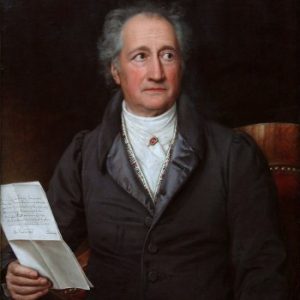
Neue Liebe, neues Leben
Herz, mein Herz, was soll das geben?
Was bedränget dich so sehr?
Welch ein fremdes, neues Leben !
Ich erkenne dich nicht mehr.
Weg ist alles was du liebtest,
Weg, warum du dich betrübtest,
Weg dein Fleiß und deine Ruh –
Ach, wie kamst du nur dazu !
Fesselt dich die Jugendblüte,
Diese liebliche Gestalt,
Dieser Blick voll Treu und Güte
Mit unendlicher Gewalt?
Will ich rasch mich ihr entziehen,
Mich ermannen, ihr entfliehen,
Führet mich im Augenblick,
Ach, mein Weg zu ihr zurück.
Und an diesem Zauberfädchen,
Das sich nicht zerreißen lässt,
Hält das liebe lose Mädchen
Mich so wider Willen fest;
Muss in ihrem Zauberkreise
Leben nun auf ihre Weise.
Die Veränderung, ach, wie groß!
Liebe! Liebe! Laß mich los!
Johann Wolfgang von Goethe
(1749-1832)
Neue Liebe, neues Leben
•fleursdumal.nl magazine
More in: Archive G-H, Archive G-H, Goethe, Johann Wolfgang von, J.W. von Goethe
 Women Poet’s Prize and Nan Shepherd Prize winner: Nina Mingya Powles publishes a much-anticipated second collection in July 2025
Women Poet’s Prize and Nan Shepherd Prize winner: Nina Mingya Powles publishes a much-anticipated second collection in July 2025
– In the Hollow of the Wave examines Orientalism, art and artmaking in a time of ecological crisis in distinctive poems that are elemental and tactile, shaped by memory and landscapes of the body.
Powles’ debut poetry collection, Magnolia, was shortlisted for the Forward Prize for Best First Collection and the Ondaatje Prize.
 Nina Mingya Powles (born 1993) is a New Zealand poet and essayist. Born in Wellington, Powles has spent time living in Shanghai and London.
Nina Mingya Powles (born 1993) is a New Zealand poet and essayist. Born in Wellington, Powles has spent time living in Shanghai and London.
Her poetry and essay collections are inspired by nature and her Chinese – Malaysian heritage, and she has received a number of notable awards including the inaugural Women Poets’ Prize in 2018.
In the Hollow of the Wave (Poems)
by Nina Mingya Powles
Nine Arches Press
ISBN: 9781916760226
Publication date: 24th July 2025
Format: Paperback
72 pp
ISBN: 9781916760226
Price: £11.99
•fleursdumal.nl magazine
More in: #Editors Choice Archiv, - Book News, - Bookstores, Archive O-P, Archive O-P, Grimm, Andersen e.o.: Fables, Fairy Tales & Stories
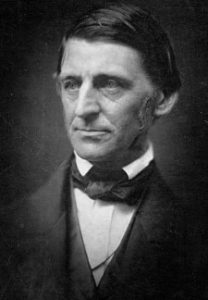
The Apology
Think me not unkind and rude,
That I walk alone in grove and glen;
I go to the god of the wood
To fetch his word to men.
Tax not my sloth that I
Fold my arms beside the brook;
Each cloud that floated in the sky
Writes a letter in my book.
Chide me not, laborious band,
For the idle flowers I brought;
Every aster in my hand
Goes home loaded with a thought.
There was never mystery,
But ’tis figured in the flowers,
Was never secret history,
But birds tell it in the bowers.
One harvest from thy field
Homeward brought the oxen strong;
A second crop thine acres yield,
Which I gather in a song.
Ralph Waldo Emerson
(1803 – 1882)
The Apology
•fleursdumal.nl magazine
More in: Archive E-F, Archive E-F, Emerson, Ralph Waldo, MONTAIGNE
Thank you for reading Fleurs du Mal - magazine for art & literature